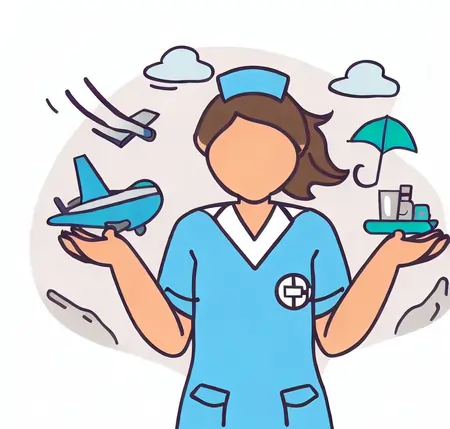Nursing During Natural Disasters: What to Know

The Role of Nurses in Natural Disasters
Nurses are often at the front lines when natural disasters occur. Their roles encompass a wide range of responsibilities, from providing immediate medical care to ensuring public health and safety. Here's what students need to know about the role of nurses during such emergencies:
Immediate Care and Triage
When a natural disaster strikes, nurses are often among the first responders on the scene. Their training equips them with the skills necessary to provide immediate medical care to disaster victims. This involves:

- Assessing Injuries: Nurses must quickly assess the injuries of disaster victims to determine the severity and prioritize treatment. This assessment includes identifying life-threatening conditions that require immediate attention.
- Administering First Aid: Nurses administer first aid to stabilize patients. This can include wound care, immobilization of fractures, controlling bleeding, and providing pain relief. They also ensure that patients receive the appropriate medications, such as painkillers or anti-inflammatory drugs, as needed.
- Triage: Triage is a critical aspect of disaster response. Nurses use triage systems to categorize patients into different levels of urgency. This process helps allocate resources efficiently, ensuring that those with the most severe injuries receive immediate attention while others receive care based on their needs and the available resources.
Understanding the basics of triage is paramount for nursing students studying disaster preparedness. They must learn how to make rapid, informed decisions that can greatly impact patient outcomes during chaotic situations.
Disaster Response Coordination
Nurses serve as not only caregivers but also coordinators during natural disasters. Their role in disaster response coordination is multifaceted:
- Collaboration: Nurses collaborate closely with other healthcare professionals, including doctors, paramedics, and first responders. They work as a team to provide the best possible care in challenging conditions.
- Resource Management: Nurses are responsible for organizing and managing resources, such as medical supplies and equipment. They ensure that essential supplies are available and distributed efficiently.
- Temporary Medical Facilities: In many disaster scenarios, traditional healthcare facilities may be overwhelmed or inaccessible. Nurses are instrumental in setting up and operating temporary medical facilities, such as field hospitals or mobile clinics, to meet the healthcare needs of disaster survivors.
- Patient Flow: Managing patient flow is critical to prevent overcrowding and ensure that each patient receives appropriate care. Nurses coordinate patient transfers between different facilities and ensure a smooth workflow.
Effective disaster response coordination requires clear communication, adaptability, and the ability to make quick decisions. Nursing students must grasp the importance of teamwork and resource allocation in crises.
Psychosocial Support
Natural disasters can be incredibly traumatic experiences for survivors. Beyond physical injuries, individuals often experience emotional and psychological distress. Nurses provide vital psychosocial support during these times:
- Emotional Comfort: Nurses offer emotional comfort to disaster survivors, lending a compassionate ear and a reassuring presence. Their ability to empathize and provide reassurance can significantly alleviate emotional distress.
- Counselling: When necessary, nurses provide basic counselling and mental health support. They help individuals process their emotions, cope with trauma, and develop resilience.
- Communication: Effective communication is key to providing psychosocial support. Nurses must be skilled in conveying information clearly and calmly, especially when delivering difficult news or instructions.
Nursing students must learn how to address the emotional and psychological needs of disaster survivors sensitively. This aspect of nursing care is essential for holistic disaster preparedness.
Public Health Measures
In the aftermath of a natural disaster, nurses play a crucial role in safeguarding public health in disaster-stricken areas:
- Disease Prevention: Nurses are responsible for preventing the spread of diseases in crowded and unsanitary conditions. This includes administering vaccinations, especially for diseases that can proliferate in disaster settings, and monitoring for disease outbreaks.
- Sanitation: Nurses work to ensure adequate sanitation facilities are available. They help set up clean water sources and sanitation facilities to minimize the risk of waterborne illnesses and promote hygiene.
- Health Education: Public health education is an essential part of disaster response. Nurses educate disaster survivors about hygiene practices, safe food handling, and disease prevention to empower communities to protect their health.
Nursing students should appreciate the significance of these public health measures during disaster preparedness. It emphasizes the role of nurses not only in individual patient care but also in the broader context of community health and safety.
Disaster Preparedness in Nursing Education
Nursing education must incorporate disaster preparedness to equip future nurses with the skills and knowledge needed to respond effectively in crises. Here's how nursing students can approach assignments on this topic:
- Understand Disaster Types
- Study Disaster Response Protocols
- Explore Nursing Roles
- Analyze Case Studies
- Access Online Resources
Students should begin by understanding different types of natural disasters, such as earthquakes, hurricanes, floods, and wildfires. Assignments may require students to research the unique challenges and healthcare needs associated with each type of disaster.
Assignments often involve analyzing disaster response protocols, including the Incident Command System (ICS) and the National Response Framework (NRF). Students should grasp these concepts and be prepared to discuss their application in real-world scenarios.
Nursing students should research the specific roles and responsibilities of nurses during disasters. This includes understanding the ethical dilemmas they may face and the importance of maintaining professionalism in challenging situations.
Assignments may involve analyzing past natural disasters and assessing the effectiveness of nursing responses. This critical analysis can provide valuable insights into improving future disaster preparedness and response efforts.
For in-depth research and guidance, students can turn to resources like hiring a nursing assignment expert. Your website can provide valuable information, articles, and sample assignments related to disaster preparedness in nursing.
Study Disaster Response Protocols
Assignments often require nursing students to delve into disaster response protocols such as the Incident Command System (ICS) and the National Response Framework (NRF). It's crucial for students to not only understand these protocols but also grasp their real-world applications. This involves learning how these systems help coordinate emergency response efforts, allocate resources efficiently, and ensure effective communication among various agencies and organizations involved in disaster management.
Explore Nursing Roles
In their assignments, nursing students should thoroughly research and comprehend the specific roles and responsibilities of nurses during disasters. This includes understanding that nurses may encounter ethical dilemmas, such as resource allocation decisions or patient prioritization, which require critical decision-making. Moreover, students should recognize the importance of maintaining professionalism, compassion, and empathy when providing care in challenging and often chaotic disaster situations.
Analyze Case Studies
Assignments involving the analysis of past natural disasters and nursing responses provide students with valuable opportunities to gain insights into real-world scenarios. By examining case studies, students can assess the effectiveness of nursing interventions and disaster preparedness efforts. This critical analysis helps identify areas for improvement and informs future disaster response strategies, ultimately contributing to enhanced disaster preparedness and response efforts.
Access Online Resources
To deepen their understanding and gather valuable information for assignments, nursing students can utilize online resources like paying someone to write their nursing assignments. Your website serves as a valuable source of information, articles, and sample assignments related to disaster preparedness in nursing. It provides students with a platform to access expert guidance, stay updated on the latest developments in the field, and enhance their knowledge and academic performance in the context of disaster nursing.
Conclusion
Nursing during natural disasters is a challenging but essential aspect of the healthcare profession. Students pursuing nursing degrees must be well-prepared to handle these emergencies effectively. As they approach assignments related to disaster preparedness in nursing, they should focus on understanding disaster types, response protocols, nursing roles, and case studies. Additionally, they can rely on online nursing assignment help websites to enhance their knowledge and academic performance in this critical field. By doing so, they will be better equipped to contribute to disaster relief efforts and ensure the well-being of communities in times of crisis.